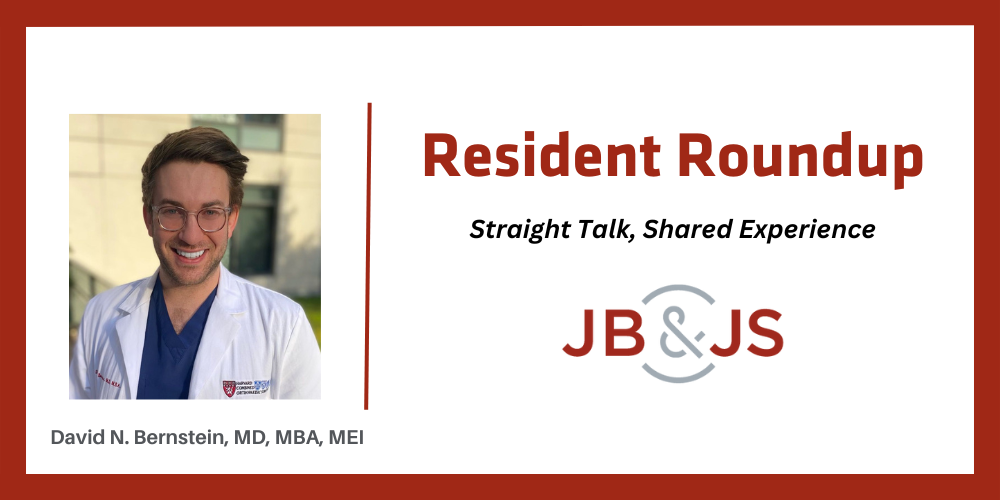This Resident Roundup post comes from David N. Bernstein, MD, MBA, MEI, who is a PGY-3 resident in the Harvard Combined Orthopaedic Residency Program (HCORP) in Boston, Massachusetts. This is the second in a 3-part Resident Roundup series on leadership and organizational involvement opportunities for trainees.
During orthopaedic surgery residency training, the demands on our time are immense. Residents work hard to optimize every minute of every day—from managing patient care responsibilities and striving to learn as much as possible over 5 years to balancing residency responsibilities with personal time needed to rejuvenate at home with family and friends. The life of a resident can get stressful, and adding another task or activity may seem daunting or even impossible.
However, I have found that there is one set of experiences for trainees that not only can feed our professional drive for excellence and help us make a positive impact across orthopaedic surgery but personally rejuvenate us as well.
Here, I’m referring to leadership work and involvement in orthopaedic societies and organizations.
Across orthopaedic surgery, societies and organizations seek residents who are passionate about their work and engaged in work that aims to make a lasting positive difference. Residents offer a fresh perspective on perplexing challenges facing musculoskeletal care and education, as well as raise issues that more seasoned orthopaedic surgeons may not recognize or appreciate—not out of neglect but simply out of a lack of personal experience or knowledge. Working together, such issues can better be addressed.
But it is not just the societies and organizations that benefit. In fact, residents benefit just as much, if not more.
Specifically, involvement in orthopaedic societies and organizations early on in residency allows us, as trainees, to:
- Expand our network within the world’s orthopaedic community and gain mentors who can help provide advice and further connections during residency and beyond;
- Develop leadership skills that can help us better manage multidisciplinary teams as a trainee and throughout our careers, to optimize patient health and outcomes; and
- Have fun with colleagues, who often become not only professional confidantes but close friends, while simultaneously moving musculoskeletal medicine forward.
It is these benefits, especially the final one, that actually reinvigorate residents through this “work”; it is not just another “task.”
How to Get Involved
There are a number of avenues residents can take to get involved. The easiest way to find out how is to seek guidance from mentors or explore society and organization websites. At a minimum, residents benefit from joining the subspecialty society or societies in the fields that most interest them. Beyond this baseline, some opportunities within societies or organizations (e.g., resident courses) simply require individuals to sign up. Others (such as the American Orthopaedic Association Council of Orthopaedic Residency Directors [AOA CORD] resident representative) require nominations and/or brief applications as part of a broader application process. There may also be unposted roles (on committees, for example) that mentors in specific fields can help residents find.
Importantly, the level of needed commitment varies with each opportunity. This allows residents to tailor our involvement based on our availability and interest. However, even roles that appear more minor can assist organizations in accomplishing their missions and can help residents reap the benefits outlined above at the same time.
I would encourage my resident friends and colleagues from around the country and worldwide to take advantage of the myriad of opportunities to get involved in orthopaedic societies and organizations. The professional benefits are clear, but the personal ones are also real. For example, my involvement in the J. Robert Gladden Orthopaedic Society as a member of the Scientific Committee has not only allowed me to continue to develop my skills in critically evaluating research, but it has also fostered a deeper mentor-mentee relationship and furthered my understanding of disparities in our field that must be addressed.
The future direction of orthopaedic surgery and its wide array of subspecialties depends on us, so why wait to make a difference?
David N. Bernstein, MD, MBA, MEI
Previously from this series:
More Resident Roundup posts:
The Importance of Mentoring During Residency
Am I a Bad Resident? Facing Self-Doubt in Orthopaedic Training



